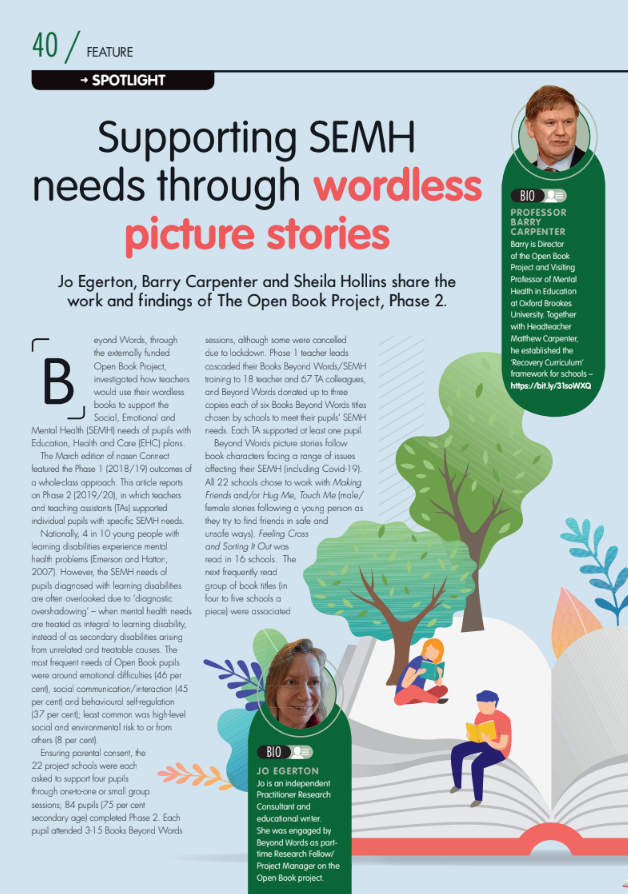Month: October 2020
How do we plan a longer term Recovery Curriculum? Building the Mental Well Being of our Children and Students.
How do we plan a longer term Recovery Curriculum? Building the Mental Well Being of our Children and Students.
Teachers are rightly concerned that after the pandemic, (and after the temporary inspection reprieve from Ofsted this term) there will be no space in the Curriculum to plan the sort of learning experiences children and young people will need to boost their mental well being .
Please look at the new guidance for Relationships, Health and Sex Education from the DfE . In the hands of any creative teacher the pathways for learning are obvious , the goals you espouse are embedded , and imaginative , meaningful teaching can be planned.
It is also statutory … not an option. Lets take this opportunity to make RHSE the heart of the curriculum,- discreet , permeated and embedded, influencing all aspects of teaching and learning. In the hands of a true teacher kindness and compassion will flow alongside knowledge , skills and attitudes, ….. vital ingredients in these challenging times.
This is the link to find out more:
What do we mean by kindness?
This question deserves an answer at this time of crisis. We have witnessed some incredible acts of kindness in our communities and in society as a whole during the pandemic period . Kindness was a major focus for World Mental Health Day .
Surely now is the time to re-evaluate what kindness can give to our own sense of well being , as well as in acts of kindness towards others. It is an essential component of the compassion that itself will be so essential to our school communities in the process of reconnection and recovery.
In this lecture Professor Carpenter discusses the positive impact of simple acts of kindness not only for the recipient , but also for the affirmation it gives to our own self esteem.
https://www.evidenceforlearning.net/recoverycurriculum/#mentalhealth
Webinar: From Reconnection to Resilience; the Recovery Curriculum in Action
A Webinar with Professor Barry Carpenter: From Reconnection to Resilience ; the Recovery Curriculum in Action.
This webinar, recently launched by the Youth Sports Trust, updates recent activity and developments around the Recovery Curriculum.
Observational Inquiry
There is a timely conversation around classroom based Inquiry . If teaching is an evidence based profession, then , at times , in order to generate that evidence , we need to engage in inquiry focused practice , systematically and deductively collecting evidence and drawings conclusions about children’s learning , attainments and achievements.
This is a particularly valuable approach where children have Complex Needs , and in this time of global pandemic , we are seeing complex profiles of mental health need emerging in our children and young people . To unravel the impact on learning will be a challenging process, . The lens of Inquiry offers us the opportunity to execute that process.
The Evidence for Learning App, with its video facility, is a perfect teacher friendly tool for collecting this evidence as data, that can then be systematically analysed ,and deductions made.
Below is an interactive webinar around Observational Inquiry , hosted by Evidence for Learning, in which two leading practitioners , Martin McKenna and Katie Fielding outline work in their schools , using the Inquiry approach. Over 100 teachers then debate how this relates to their practice in their schools , the value of the approach , and the longer term implications.
Reflections on a Recovery Curriculum: A conversation with Barry Carpenter, Professor of Mental Health
https://register.gotowebinar.com/register/9069390241517907212?aa=aa&dm_i=BBQ,72RT8,EA35SV,SL1PY,1
Date: Thu, Oct 22, 2020 5:00 PM – 6:30 PM BST
How do children cope with loss? How can anxiety impact their ability to learn? And how can we reignite children’s motivation to learn, in a world that is dramatically changing?
Join experts from Oxford Brookes’ MA Education programme to explore the Recovery Curriculum, a relationships-based approach to developing mental wellbeing in children. We’ll examine how a curriculum can respond to children’s emotional needs – and make sense of their experiences. And in a world where our students – and indeed ourselves – are coping with untold stress, we’ll look at how we can prioritise emotional wellbeing across whole school communities.
With Jonathan Reid, MA Education SEND Strand Leader and Senior Lecturer in Child Development, SEND and Inclusion at Oxford Brookes University Barry Carpenter, Professor of Mental Health, Oxford Brookes University
Special Offer on the Lenny and Lily Children’s book series
Compassionate Leadership: Re-engaging learners and staff through Recovery Curriculum
Social Care in the Pandemic
There is much debate around how the Care sector has handled their response to the coronavirus pandemic.
In this article, Ruth Smith, CEO, Active Care Group, describes the creative and careful approach taken in her organisation , particularly in supporting clients with Acquired Brain Injury, staff, and families.
New NASEN article: Supporting SEMH needs through wordless picture stories
New article: “Supporting SEMH needs through wordless picture stories”
Egerton J., Carpenter, B., and Hollins , S . (October 2020). Connect journal
Download a copy below by clicking here, or clicking the article cover below.
